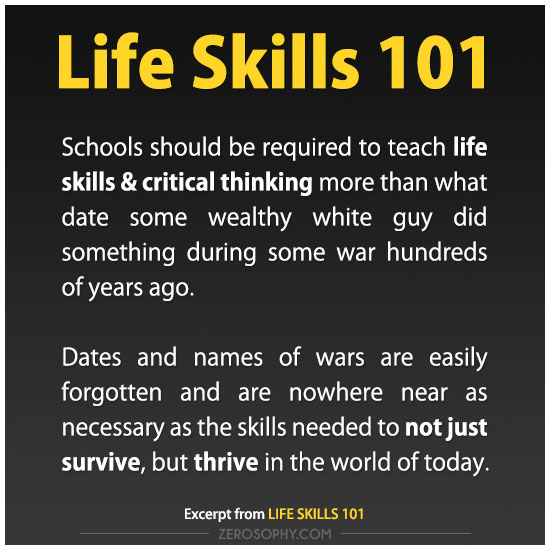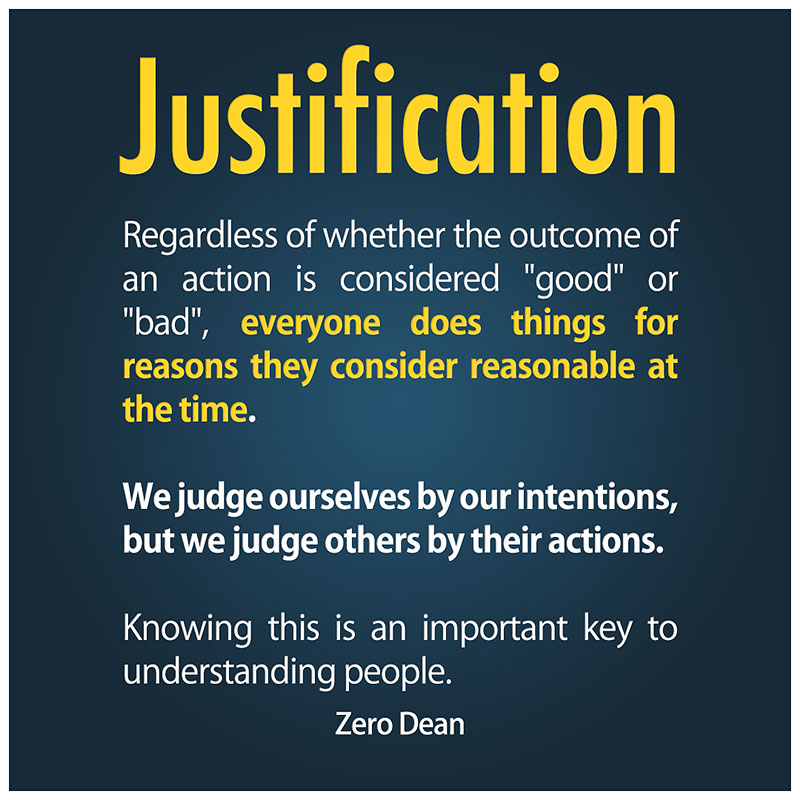Schools should be required to teach life skills & critical thinking more than on what exact date some wealthy white guy did something during some war that took place hundreds of years ago.
Exact dates and names of wars are easily forgotten and are nowhere near as necessary to know as the skills needed to not just survive, but thrive in the world of today.
- How to balance a checkbook.
- How to manage money.
- How to get a job that suits you.
- How to get along well with others.
- How to channel your emotions into something positive.
- How to communicate effectively.
- How to learn from mistakes.
- How to deal with failure.
- How to deal with depression.
- How to cope with loss of a parent, friend, or loved one.
- How to challenge authority respectfully.
- How to protest peacefully.
- How to think independently.
- How to find joy in learning.
- How not to rush into relationships or marriage or parenthood.
- How not to end up in divorce.
- How to be a courteous driver.
- How to stay healthy.
- How to deal with stress.
- How to live within your means.
- How to be polite.
- How to respect others.
- How to beat shyness.
- How to make friends.
- How to keep friends.
- How to overcome fears.
- How to live in harmony with others.
- How to be respectful of people that are different than you.
- How to keep your workspace clean.
- How to study.
- How to handle a heavy workload.
- How to take risks.
- How to dance.
- How to listen.
- How to be yourself.
- How to find your inner voice.
- How to teach effectively.
- How to help others.
- And how to put a roll of toilet paper on the spindle.
We are left to learn these things on our own when, instead, they should be the curriculum upon which all other skills are added.
If every person knew all these things, the world we live in would be a different place.
—
Please note:
My list is not about suggesting that other things shouldn’t be taught. My list is about prioritizing what we learn and teach based on its ability to help maximize the lives of those who learn it.
What is the purpose of teaching things that provide no real-world practical value beyond the classroom in which they are taught?
And just to be clear, I’m not discounting the importance of history (or any other classes currently taught in school). The takeaways from history are important lessons to learn.
However, I am making an example by discounting the fact that the exact date that some white guy landed his ship on a rock — or who the traitor was in a long-forgotten war — has no direct bearing on anyone’s life today (except maybe those who teach history).
Learning who led what army in what war on what day may be an interesting part of history, but it doesn’t help anyone escape poverty.
And yet this is what children are made to memorize before they eventually enter the adult world and realize that the names and dates they’ve learned won’t have any real practical value in their daily lives.
“Dammit, Phyllis! The reason we’re still poor and unable to afford a proper education for our children is because Benedict Arnold was an American traitor and Paul Revere warned us that the British were coming. Thanks, Obama!”
Critical thinking, problem solving, effective communication, handling stress, and learning to live within one’s means — along with the majority of other life skills listed above — matter a lot more in most people’s lives than the names and dates of wars.
And if these things matter more, doesn’t it make sense that everyone should be learning these skills as soon as subjects are of an appropriate age to learn them?
Doesn’t it make sense that we should all have an equal opportunity to learn the skills necessary to handle life?
“Now hold on,” I hear you say, “Shouldn’t this list be the responsibility of parents to teach?”
Ideally, yes. But here’s the problem, not all parents learned these things. And parents can’t, won’t, or don’t teach what they don’t know.
Nor do they necessarily have what it takes (resources, time, mindset, desire…) to learn them as an adult. People often become set in their ways.
I think that if or when it’s culturally common for parents to actually know all of these things, then we can leave these things in the hands of parents to teach.
But in the world of today, not all parents teach these things and so not all children learn these things — and that’s how a large part of the problem perpetuates itself.
The poor stay poor. Teen pregnancy leads to teen pregnancy. Bad communication breeds bad communication.
But on the other end, the children of the educated get the best education. They get better jobs. They get more opportunities and more chances to make even more money.
And the children of the educated pass on many of these life skills to their children because they are educated.
They know these things, so they can teach these things.
But it’s not happening in every home.
But it could happen in every school.
“…In large part, inequality starts in the crib. Rich parents can afford to spend more time and money on their kids, and that gap has only grown the past few decades. Indeed, economists Greg Duncan and Richard Murnane calculate that, between 1972 and 2006, high-income parents increased their spending on “enrichment activities” for their children by 151 percent in inflation-adjusted terms, compared to 57 percent for low-income parents.
But, of course, it’s not just a matter of dollars and cents. It’s also a matter of letters and words. Affluent parents talk to their kids three more hours a week on average than poor parents, which is critical during a child’s formative early years. That’s why, as Stanford professor Sean Reardon explains, “rich students are increasingly entering kindergarten much better prepared to succeed in school than middle-class students,” and they’re staying that way.
It’s an educational arms race that’s leaving many kids far, far behind.” — By Matt O’Brien from this Washington Post article
Supplemental reading:
- Poor kids who do everything right don’t do better than rich kids who do everything wrong
- This article (from today!) was just brought to my attention: Mindfulness [class] helps teens cope with stress, anxiety
Related:




